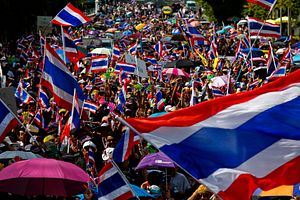While Thailand was gripped by news of the king’s death last week, another important anniversary had passed the week before in the Southeast Asian state. Forty years ago on October 6, more than 40 student protesters were killed inside the Tha Prajan campus of Thammasat University. The identity of the killers is unknown to this day but the attack was led by state forces and an anti-communist mob.
The casualties could be higher because no official probe has been made by the government to find out the truth about the incidents leading to the massacre. What we have are testimonies from the few survivors and journalists who documented the brutality of the attack.
After 40 years, survivors of the massacre and the relatives of the dead victims continue to seek justice. It is a lonely battle because this tragic episode is not mentioned in Thailand’s history books. The military, which staged a coup after the massacre, has conspired with successive governments up to the present to hide the truth about the massacre.
It took Thailand more than two decades before it built a memorial for the massacre victims inside Thammasat University. It is only this year that Chulalongkorn University has organized an event to commemorate the massacre even if many of its students were killed, wounded, and arrested on that day.
Earlier this month, the anniversary of the massacre grabbed global headlines because of Thailand’s decision to ban the entry of Hong Kong activist Joshua Wong who was scheduled to speak in Bangkok about the student movement.
Thailand’s kowtowing to China is most unfortunate and it reflects the current state of democracy, free speech, and human rights in the country under the leadership of the National Council for Peace and Order.
But the 40th anniversary of the massacre can also provide us with valuable insights about contemporary political realities not just in Thailand, but also in other Southeast Asian countries. Here are some of them:
The student protesters were demonized as communists and traitors who wanted to remove the monarchy, a beloved institution in Thailand. This insidious propaganda inflamed hatred which contributed to the mentality that the protesters deserved to die in a brutal way. The same propaganda tactics are being used today against Thailand’s Red Shirts and Myanmar’s Rohingya.
No one was arrested and charged in the courts for ordering the brutal killing of students. This impunity has allowed the army and other state forces to commit more human rights violations and abuses in succeeding years. We also saw this kind of impunity in Indonesia where an anti-communist hysteria led to the killing of more than half a million suspected communists in 1965.
An effective way to prevent the people from challenging the present is to control their views about the past. The military rulers of Thailand and Indonesia are aware of this, which explains their obsession to hide the atrocities of the army in 1965 and 1976. In some cases, historical revisionism is being done like in the Philippines today where the Marcoses are denying that many Filipinos suffered human rights abuses during the Martial Law era in the 1970s.
It is not enough to remember the wounds of the past. The quest for justice requires the prosecution and punishment of those who committed crimes against humanity. The Khmer Rouge trial today is an example of how victims can effectively seek redress from the state. The establishment of a truth and reconciliation commission, which was initially proposed in Indonesia, is also a good start for the healing process.
And finally, it is only under a democratic regime that we can successfully demand accountability. It is difficult for the victims of state-sponsored violence to share their stories if the government is controlled by the military. Therefore, the campaign for justice in Thailand is also inevitably a political struggle for the restoration of civilian rule. And while those who are most active in commemorating the event of the 1976 massacre are mostly aging activists, it is refreshing to see a new generation of activists committed to the return of democracy in Thailand.

































